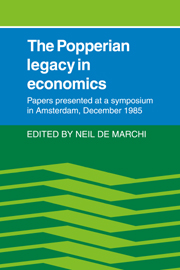Book contents
- Frontmatter
- Contents
- Preface
- List of contributors
- Introduction
- Discussion
- Part I Popper as a philosopher of science
- Part II Popper among the economists
- Part III Falsification and trying to do without it
- Part IV The missing chapter: empirical work and its appraisal
- 7 Finding a satisfactory empirical model
- 8 The neo-Walrasian program is empirically progressive
- Part V Non-Popperian perspectives on economics
- Index
8 - The neo-Walrasian program is empirically progressive
Published online by Cambridge University Press: 05 January 2012
- Frontmatter
- Contents
- Preface
- List of contributors
- Introduction
- Discussion
- Part I Popper as a philosopher of science
- Part II Popper among the economists
- Part III Falsification and trying to do without it
- Part IV The missing chapter: empirical work and its appraisal
- 7 Finding a satisfactory empirical model
- 8 The neo-Walrasian program is empirically progressive
- Part V Non-Popperian perspectives on economics
- Index
Summary
Economists and philosophers agree that general equilibrium analysis is important, but they disagree with each other, and among themselves, on its role in the growth of economic knowledge (see, for example, Hahn, 1973; Coddington, 1975; Blaug, 1980; Hausman, 1981; Kotter, 1983; Klant, 1984; Hands, 1985; Rosenberg, 1986).
In a number of recent studies (Weintraub, 1979, 1985a, 1985b) I have presented the view that is associated with a scientific research program in the sense of Lakatos, and that the Arrow–Debreu–McKenzie model (which many economists and philosophers take to be general equilibrium theory) is an instantiation of the hard core of what I have called “the neo-Walrasian research program.” I have argued that the development of existence proofs is an example of the “hardening” of the hard core of that program. I have also suggested that the hard core of the program guides work in the protective belts of the program, and that work in the belts is appropriately appraised by asking questions about both theoretical progress and empirical progress; within the neo-Walrasian program, the positive heuristic connects formal theory to empirical work. If the neo-Walrasian program is roughly coextensive with neoclassical economics, general equilibrium analysis shapes a research agenda for applied economic analysis.
This claim has drawn some attention, not all of it sympathetic (Rosenberg, 1986). In particular, Rosenberg has argued that although this set of ideas reconstructs the core of the program, the real issues concern the role of the theories in the protective belts.
- Type
- Chapter
- Information
- The Popperian Legacy in EconomicsPapers Presented at a Symposium in Amsterdam, December 1985, pp. 213 - 228Publisher: Cambridge University PressPrint publication year: 1988
- 14
- Cited by

